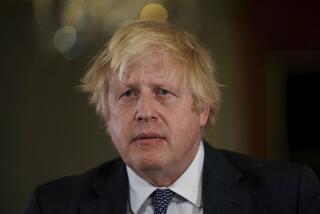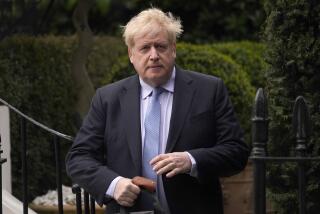Thatcher Crisis Deepens as 2nd Minister Quits
- Share via
LONDON — Prime Minister Margaret Thatcher’s Conservative government slipped deeper into crisis Friday when mounting political pressure forced her trade and industry secretary, Leon Brittan, to resign.
Brittan is the second senior minister in 15 days to leave Thatcher’s Cabinet as a dispute over the future of a small, financially ailing defense contractor has mushroomed into the most serious domestic crisis of her 6 1/2 years as prime minister.
It was Defense Secretary Michael Heseltine’s dramatic resignation in the middle of a Cabinet meeting Jan. 9 that transformed differences over the fate of Westland PLC into a damaging political affair.
Brittan’s departure constitutes a far more ominous turn for Thatcher. For the first time it leaves her directly exposed to the full force of the mounting political storm. A prime minister widely acknowledged as one of the most secure in Western Europe has, within the space of two weeks, slipped into serious danger.
As the hint of scandal laps at the prime minister’s office itself, an emergency parliamentary debate has been scheduled on the affair Monday.
In pointed questions reminiscent of those put to former President Richard M. Nixon during the Watergate scandal, opposition leaders are now asking how much Thatcher herself knew about the leak of a sensitive government document that helped to discredit those opposed to her in the affair. The document at issue is a letter from Atty. Gen. Patrick Mayhew accusing Heseltine of inaccurate public statements.
Could Be Forced Out
If Monday’s debate links her personally to the leak or proves that she had detailed knowledge of it shortly after it occurred, she could be forced to resign.
“The prime minister has still got a great deal of answering to do,” Neil Kinnock, leader of the opposition Labor Party, said Friday.
David Owen, Social Democratic Party leader and former foreign secretary, said that Brittan’s resignation “does not in any way reduce the necessity now for the prime minister to come clean with the House of Commons. She has to do that.”
Late Friday, there were signs that Conservative legislators were rallying around their prime minister. Should she survive Monday’s debate, and most believe she will, her authority is likely to be eroded by the affair.
In a lengthy statement to Parliament on Thursday after an investigation, Thatcher was forced to admit that the decision to leak Mayhew’s letter was made by officials in her own office and at the Trade and Industry Department. The leak was eventually authorized by Brittan.
Regrets Leak
She said she regretted the way in which the letter had become public, but defended the action in principle, claiming that the record had to be corrected quickly before an important news conference scheduled by Westland’s chairman.
Without consulting Mayhew, contents of the letter were passed by telephone to a reporter for the country’s main domestic news agency, the Press Assn.
In her statement Thursday, Thatcher said she had not been consulted about the decision to leak the letter although she was in her offices at No. 10 Downing Street at the time. She said she had not become aware of “the full facts” of the leak until the day before her statement.
The way the leak occurred is especially embarrassing for Thatcher since her government has taken tough action against civil servants accused of passing official papers to the press.
Brittan was widely seen as Thatcher’s front man in the Cabinet fight against Heseltine over how Westland, Britain’s only maker of military helicopters, should be rescued from insolvency. His actions have been the subject of mounting controversy for the past two weeks.
He was nearly forced to resign Jan. 14 after he appeared to mislead Parliament during a debate on the affair. He denied the existence of a letter which surfaced hours later. Then the letter’s contents appeared to contradict statements he had made earlier.
Forced to Apologize
Brittan was forced to apologize to Parliament for his actions and survived mainly due to Thatcher’s spirited defense of him the following day. However, revelations that he authorized the leak of the attorney general’s letter proved fatal.
Following Thursday’s parliamentary statement, a majority of Conservative legislators reportedly were demanding that Brittan resign so as to defuse the crisis and restore the government’s credibility.
Thatcher reportedly tried but failed to talk Brittan out of resigning. Her letter of response was warm, full of praise for his accomplishments and ended with the hope that he will resume his ministerial career soon.
Youngest Minister
Brittan, 46, was the youngest member of Thatcher’s Cabinet when he was named chief treasury secretary in 1981. Following the 1983 Conservative election victory, he became the youngest home secretary since Winston Churchill.
He was seen as a brilliant administrator, but a poor parliamentarian who sometimes let his loyalty to Thatcher obscure his judgment. After becoming embroiled in a controversy over the censoring of a British Broadcasting Corp. documentary on terrorism, he was moved to what was seen to be the less sensitive job of secretary for trade and industry.
It was in this job that he supported and campaigned for Thatcher’s apparent preference that Westland be rescued by a consortium led by the American manufacturer, United Technologies Corp. Heseltine had believed it vital for the future of Europe’s helicopter industry that a European consortium be permitted to save Westland.
More to Read
Sign up for Essential California
The most important California stories and recommendations in your inbox every morning.
You may occasionally receive promotional content from the Los Angeles Times.













